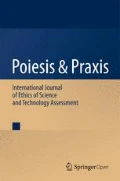Abstract.
The often-emphasized tension between the singularity of the patient and technical–scientific reproducibility in medicine cannot be resolved without a discussion of the epistemological and methodological status of the human sciences. On the one hand, the rules concerning human action are analogous to the scientific laws of nature. They are de facto sufficiently stable to allow predictions and explanations similar to those of experimental sciences. From this point of view, it is only a trivial truth, but still a methodological irrelevancy, that the patient and the doctor–patient relationship represent an ontologically irreproducible reality. On the other hand, however, one can never exclude that one can fail in the application of "laws" of the human sciences to the individual patient, for such laws are by no means wholly separated from a patient's personal-hermeneutic mediation, and can at any time be revoked by becoming aware of them. This requires a synergistic collaboration of clinical and statistical methods, and shows a methodologically relevant sense in which one cannot disregard the singularity of the patient. The reason for the crucial role of the patient's singularity in medicine is every individual patient's capacity to revoke, in principle, routines and quasi-automatisms, even though the personal mediation by the patient's consciousness de facto changes them in such a small degree that predictions and explanations modeled in experimental science remain possible.
Zusammenfassung.
Ohne eine Diskussion des epistemologischen und methodologischen Status der Humanwissenschaften kann die oft hervorgehobene Spannung zwischen der Singularität des Patienten und wissenschaftlich-technischer Reproduzierbarkeit in der Medizin nicht überwunden werden. Einerseits sind die Regeln für das menschliche Handeln analog zu wissenschaftlichen Naturgesetzen. Sie sind de facto beständig genug, um Vorhersagen und Erklärungen zu ermöglichen, ähnlich wie sie von den experimentellen Wissenschaften angeboten werden. Aus diesem Blickwinkel betrachtet ist es eine triviale, aber methodologisch irrelevante Feststellung, dass das Verhältnis zwischen Arzt und Patient eine ontologisch nicht reproduzierbare Realität darstellt. Andererseits kann man jedoch nie ausschließen, dass die Anwendung der "Gesetze" der Humanwissenschaften auf den einzelnen Patienten fehlschlägt, da solche Gesetze keineswegs völlig von der persönlich-hermeneutischen Vermittlung des Patienten zu trennen sind und jederzeit durch ihre Bewusstwerdung aufgehoben werden können. Dies macht ein synergistisches Zusammenwirken klinischer und statistischer Methoden notwendig und zeigt methodologische Relevanz in dem Sinne, dass die Singularität des Patienten nicht vernachlässigt werden kann. Die Ursache, weshalb die Singularität des Patienten in der Medizin eine entscheidende Rolle spielt, liegt in der prinzipiellen Fähigkeit des Patienten, Routinen und Quasi-Automatismen aufzuheben, wenngleich die persönliche Vermittlung durch das Bewusstsein des Patienten diese de facto in so geringem Maße ändert, dass Vorhersagen und Erklärungen nach dem Vorbild der experimentellen Wissenschaften weiterhin möglich bleiben.
Résumé.
L'idée de la tension, si souvent soulignée, entre d'une part la singularité du patient et la reproductibilité technique/scientifique en médecine d'autre part, ne peut être destituée sans entreprendre auparavant une discussion quant au statut épistémologique et méthodologique des sciences humaines. En premier lieu, les règles se rapportant aux actions humaines sont analogues aux lois scientifiques de la nature. Ces règles sont de facto suffisamment stables pour permettre de réaliser des prédictions et de donner des explications, prédictions et explications similaires à celles des sciences expérimentales. Considéré de ce point de vue, le fait que le patient et que les relations docteur – patient représentent une réalité ontologique ne pouvant être reproduite, est donc non seulement une vérité triviale mais également une non-pertinence méthodologique. En second lieu toutefois, en appliquant les "lois" des sciences humaines au patient individuel, l'apparition d'erreurs ne pourra jamais être totalement exclue, de telles lois étant toujours liées à une médiation personnelle – herméneutique du patient, le fait d'en prendre connaissance pourra toujours conduire à leur révocation. Tous ces facteurs montrent donc bien la nécessité d'une collaboration synergétique de méthodes cliniques et de méthodes statistiques, ils indiquent également un sens méthodologiquement pertinent où la singularité du patient ne doit en aucun cas être négligée. La raison pour le rôle crucial de la singularité du patient dans la médecine tient à la capacité de chaque patient individuel d'abolir, en principe, des routines et des quasi-automatismes même si, de facto, la médiation personnelle par la conscience du patient les modifie à un degré tellement minimal que des prédictions et des explications se modélisant sur les sciences expérimentales seront toujours possibles.
Similar content being viewed by others
Author information
Authors and Affiliations
Additional information
Electronic Publication
Rights and permissions
About this article
Cite this article
Buzzoni, M. Medicine as a human science between the singularity of the patient and technical scientific reproducibility. Poiesis Prax 1, 171–184 (2003). https://doi.org/10.1007/s10202-002-0018-x
Issue Date:
DOI: https://doi.org/10.1007/s10202-002-0018-x




